|
In a Seville square, at dawn.
The Count of Almaviva is fond of Rosina, a rich girl protected by Don Bartolo. He tries to obtain her attention by a serenade. But nobody shows at the balcony, so Almaviva hides under a portico, waiting for a better moment. In the meantime he heards at a distance the voice of Figaro, barber and factotum della citty, well known and appreciated in Seville. He too arrives near Don Bartolo's house, longing to marry Rosina to earn her marriage portion, and he meets the Count, an old friend of his, and promises him to be of help.
Figaro is renowned in Bartolo's home not only as a barber, but also as speziale. This will allow him to introduce the Count to Bartolo without too much suspicions.
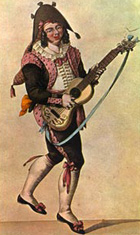 In that moment Rosina appears on the balcony: she has a hand-written note she'd like to throw at the singer of the serenade, but Don Bartolo arrives and she is forced to stop. She has to fool Bartolo, telling him that the note contains only the words of the Aria Inutil Precauzione, and she swiftly drops the note. Almaviva takes it promptly. The old Bartolo angrily goes out, locking the balcony door, and goes to prepare his wedding with Rosina. In the meantime Almaviva reads the note, and sings another serenade to Rosina, pretending to be a poor student named Lindoro. He does so because he does not want to conquer Rosina's heart by his noble birth and by his money. At the end of the serenade Figaro proposes to Almaviva a plan to go into Don Bartolo's house. He will disguise himself as a Royal Army soldier, and will commandeer a room in Bartolo's house. Moreover, he will pretend to be drunk, to avoid being considered a rival by the suspicious old man.
In that moment Rosina appears on the balcony: she has a hand-written note she'd like to throw at the singer of the serenade, but Don Bartolo arrives and she is forced to stop. She has to fool Bartolo, telling him that the note contains only the words of the Aria Inutil Precauzione, and she swiftly drops the note. Almaviva takes it promptly. The old Bartolo angrily goes out, locking the balcony door, and goes to prepare his wedding with Rosina. In the meantime Almaviva reads the note, and sings another serenade to Rosina, pretending to be a poor student named Lindoro. He does so because he does not want to conquer Rosina's heart by his noble birth and by his money. At the end of the serenade Figaro proposes to Almaviva a plan to go into Don Bartolo's house. He will disguise himself as a Royal Army soldier, and will commandeer a room in Bartolo's house. Moreover, he will pretend to be drunk, to avoid being considered a rival by the suspicious old man.
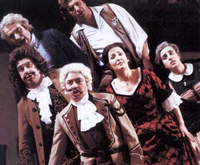
In a room of Don Bartolo's house.
Rosina would like to send another note to Lindoro and asks for Figaro's help. The conversation is abruptly truncated by the coming of Bartolo with Rosina's music teacher, Don Basilio. Bartolo and Basilio start a conversation: the old man wants to hurry with the wedding and to send Almaviva out of Seville. Basilio gives his advice: to get rid of the Count by a calumny. Shortly after they go away to write the wedding contract, so Figaro and Rosina can meet again.
The barber tells her that Bartolo wants to marry her on the following day, and that Lindoro wants to meet her. The girl gives her note to Figaro in an envelope.
When the old man arrives, he becames more and more suspicious. Someone knocks to door: it's the Count, disguised as a soldier and asking for a room. While Bartolo is protesting, the false soldier succeeds in speaking to Rosina, telling her to be Lindoro and giving her a note. But the note is seen by Bartolo, who orders to give him the paper. There is a moment of general confusion, and Rosina substitutes the love note with the laundry list. But in the meantime some guards enter the house, trying to arrest the drunk soldier. The Count shows a paper to the head of the guards, and he promptly stands to attention, while everyone looks astonished the scene.
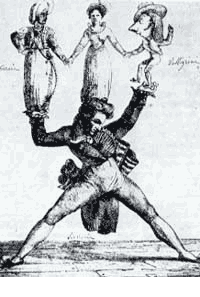 In Bartolo's study room.
In Bartolo's study room.
The old man is always more suspicious and afraid, when the Count arrives again at the door, pretending to be Don Alonzo, a music teacher sent by Don Basilio, who lies ill, to substitute him. Bartolo is diffident, so to be trusted the Count gives to Bartolo the note from Rosina, as if it were addressed to the Count of Almaviva, to be used as a calumny against the Count. Don Bartolo, happy, trusts him and calls Rosina for the music lesson.
While the two lovers are simulating a music lesson, Figaro
arrives and starts shaving Bartolo. He succeeds in stealing
the balcony key, needed by the lovers to flee away in the night.
At once, Don Basilio arrives and is going to discover the truth: he is
convinced to pretend being ill by a heavy money bag; but Don Bartolo finally understands all.
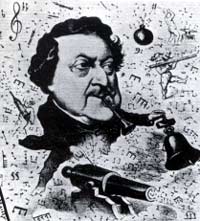 Don Bartolo asks Basilio to bring immediately a Notary. He shows to Rosina the note given him by Lindoro, and convinces her that Lindoro doesn't love her, as he is only a servant of the Count. She is convinced and accepts to marry Bartolo.
Don Bartolo asks Basilio to bring immediately a Notary. He shows to Rosina the note given him by Lindoro, and convinces her that Lindoro doesn't love her, as he is only a servant of the Count. She is convinced and accepts to marry Bartolo.
But Figaro and Lindoro thrive to enter the house, and they reveal to Rosina that Lindoro and the Count are the same person. While the two lovers try to escape the house, they discover that the stair prepared by Figaro to go down the balcony has been removed, and in the same moment Don Basilio comes with the Notary. Figaro tries the last chance, and introduces the two youngs as the betrothed. Don Basilio is convinced to stay silent by a gift and is kept quiet with a gun.
When Don Bartolo arrives with the guards, the two lovers are already married. The Count reveals his real identity, and to calm down the desperate old Bartolo he offers him Rosina's dowry. The opera ends in happiness and laughing.
|


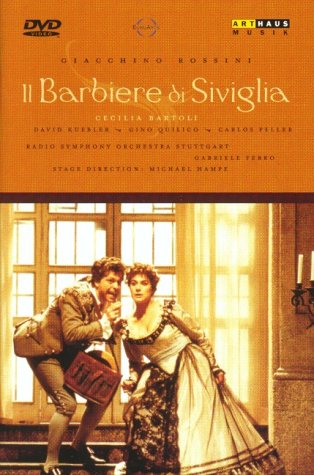
![]()

 VIEW IL BARBIERE DI SIVIGLIA HIGHLIGHTS
VIEW IL BARBIERE DI SIVIGLIA HIGHLIGHTS

 In that moment Rosina appears on the balcony: she has a hand-written note she'd like to throw at the singer of the serenade, but Don Bartolo arrives and she is forced to stop. She has to fool Bartolo, telling him that the note contains only the words of the Aria Inutil Precauzione, and she swiftly drops the note. Almaviva takes it promptly. The old Bartolo angrily goes out, locking the balcony door, and goes to prepare his wedding with Rosina. In the meantime Almaviva reads the note, and sings another serenade to Rosina, pretending to be a poor student named Lindoro. He does so because he does not want to conquer Rosina's heart by his noble birth and by his money. At the end of the serenade Figaro proposes to Almaviva a plan to go into Don Bartolo's house. He will disguise himself as a Royal Army soldier, and will commandeer a room in Bartolo's house. Moreover, he will pretend to be drunk, to avoid being considered a rival by the suspicious old man.
In that moment Rosina appears on the balcony: she has a hand-written note she'd like to throw at the singer of the serenade, but Don Bartolo arrives and she is forced to stop. She has to fool Bartolo, telling him that the note contains only the words of the Aria Inutil Precauzione, and she swiftly drops the note. Almaviva takes it promptly. The old Bartolo angrily goes out, locking the balcony door, and goes to prepare his wedding with Rosina. In the meantime Almaviva reads the note, and sings another serenade to Rosina, pretending to be a poor student named Lindoro. He does so because he does not want to conquer Rosina's heart by his noble birth and by his money. At the end of the serenade Figaro proposes to Almaviva a plan to go into Don Bartolo's house. He will disguise himself as a Royal Army soldier, and will commandeer a room in Bartolo's house. Moreover, he will pretend to be drunk, to avoid being considered a rival by the suspicious old man.

 In Bartolo's study room.
In Bartolo's study room. Don Bartolo asks Basilio to bring immediately a Notary. He shows to Rosina the note given him by Lindoro, and convinces her that Lindoro doesn't love her, as he is only a servant of the Count. She is convinced and accepts to marry Bartolo.
Don Bartolo asks Basilio to bring immediately a Notary. He shows to Rosina the note given him by Lindoro, and convinces her that Lindoro doesn't love her, as he is only a servant of the Count. She is convinced and accepts to marry Bartolo.